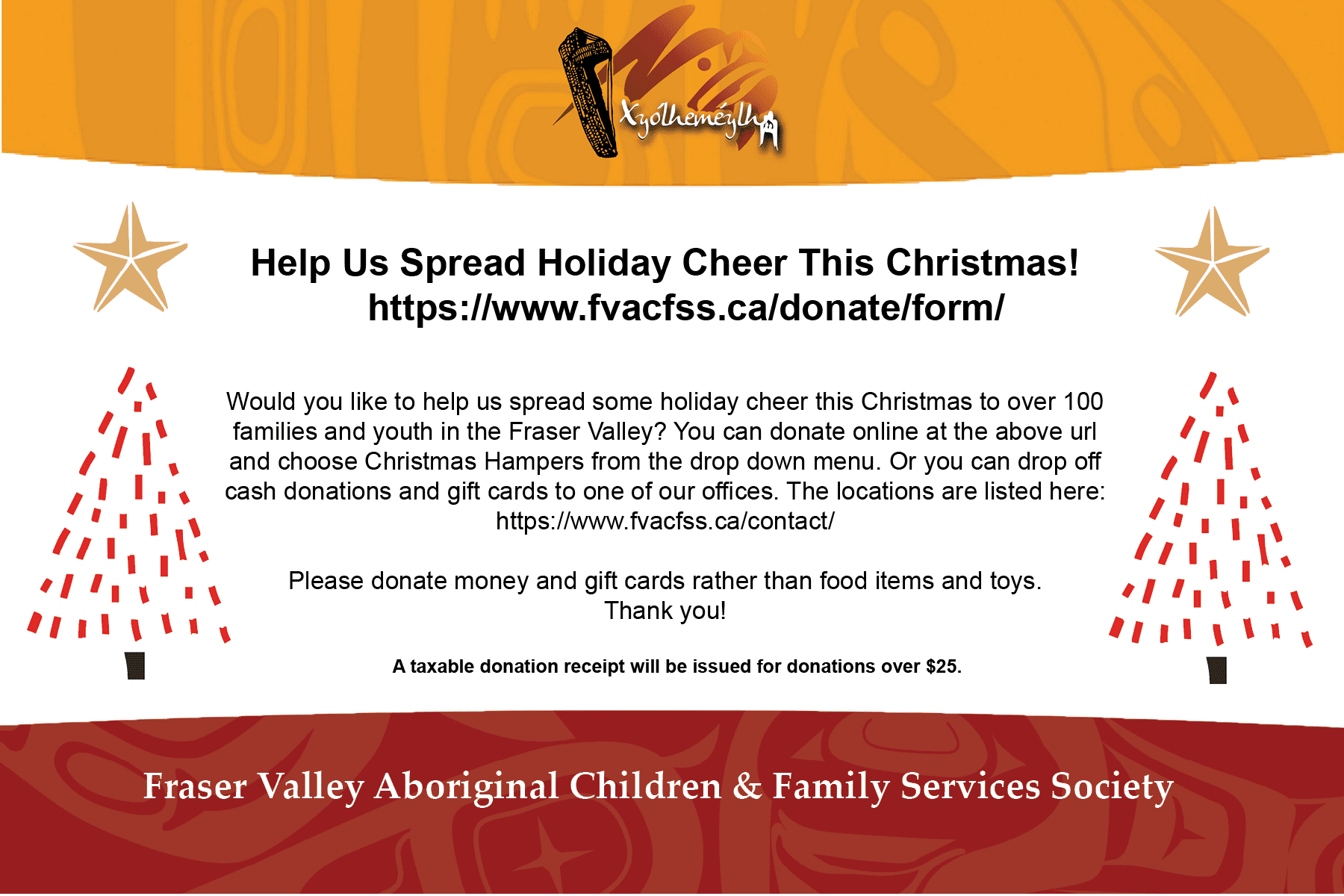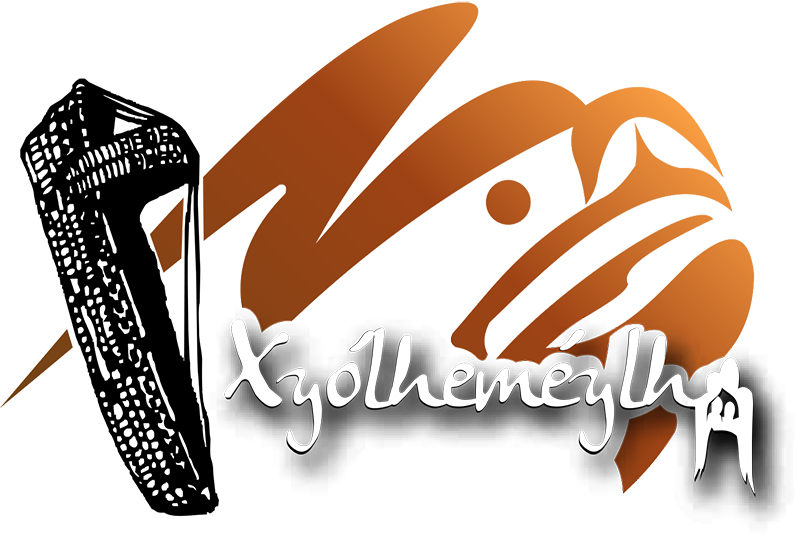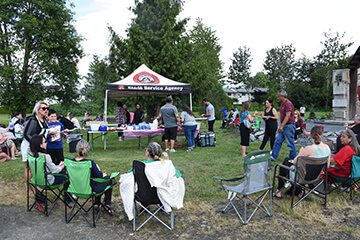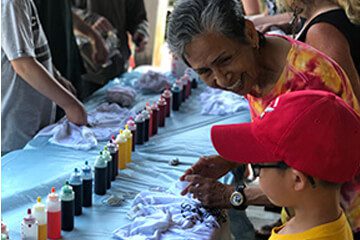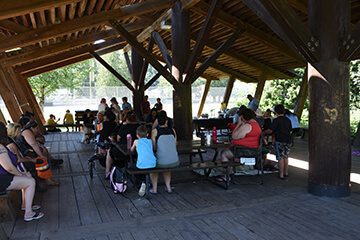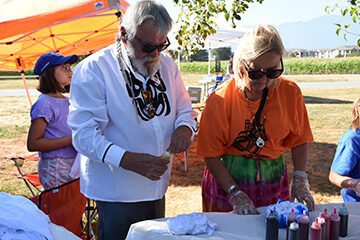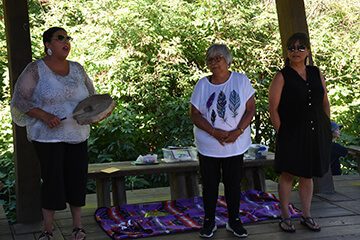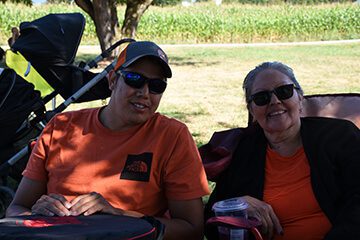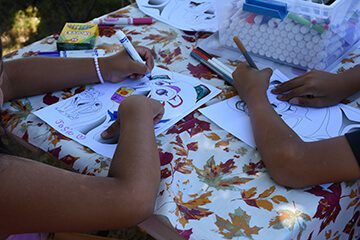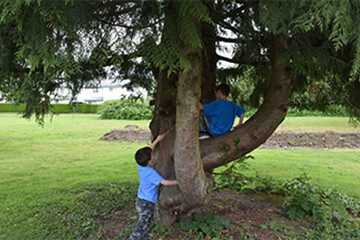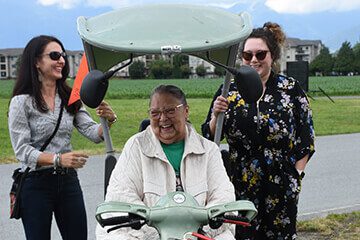Message from the board of directors
Fraser Valley Aboriginal Children & Family Services Society
Sqwélqwel - Xyólheméylh Fall 2022 Newsletter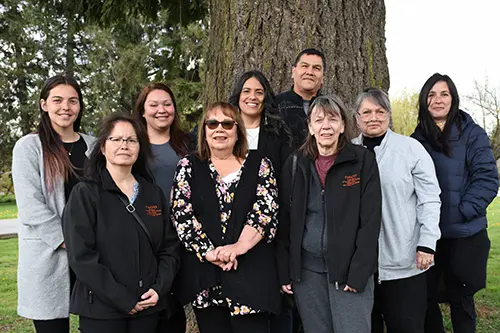
The Board of Directors: L-R - Jade Victor, Paula Olmstead, Jennifer Janik, Glenda Campbell, Jolene Irons-McDivitt, Peter John, Tammy Bartz, Marion Mussell, Dr. Wenona Hall.
Welcome to our Fall Newsletter. We hope everyone had a good summer as we enter the fall months and the Stó:lō New Year.
We are preparing for our Annual General Meeting to be held November 21st. We are anticipating being able to hold the meeting in person for the first time in three years but will have to monitor the COVID situation this fall and of course, follow health and safety guidelines. We have sent out an AGM package to members with our Annual Report and the forms needed to participate. For information regarding membership please contact Carissa Gray by phone at 236-984-5362 or email at [email protected].
There are five Board seats open for election. The nominations meeting was held October 24th and eight nominees were approved for the ballot. Thank you to all the nominees who put their names forward.
We have two Board members who have served their maximum years on the board (two consecutive three year terms), Marion Mussel from Skwá First Nation and Peter John from Chowéthel First Nation. We would like to extend our appreciation to you for your dedication and commitment to the work of the Board and the direction and governance you provided to Xyólheméylh. We raise our hands in gratitude to you, yalh yexw kwas:oy.
Finally, you may notice that we are using “Xyólheméylh” more often to refer to the work we do. Our Elders have recommended we use this word in replace of “agency” in our everyday language as it better describes the work we need to do and reminds us of the importance of all the relationships needed to strengthen our families and communities. The Board Cultural Committee has begun the good work in this area, for example reaching out to the Si:yólexwe who named us and to current and past name carriers.
In the spirit of the Stó:lō New Year, we wish you a happy autumn, full of new beginnings and filled with hope and love.
Ey Sqwalewel (with good feeling/heart)
Ts’qwelemót
Dr. Wenona Hall, Board President
Board of Directors: Dr. Wenona Hall (President), Marion Mussell (Vice-President), Glenda Campbell (Secretary), Jennifer Janik (Treasurer), Tammy Bartz, Peter John, Paula Olmstead, Jolene Irons-McDivitt and Jade Victor.
Message from Executive Leadership Team
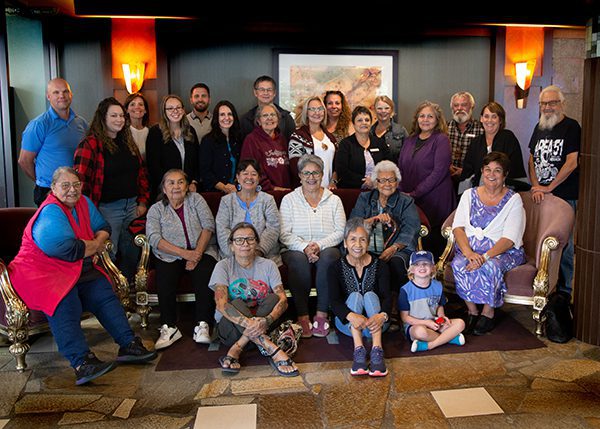
Pictured Above: Xyólheméylh Elders Advisory Council and Leadership team in Harrison.
Summer BBQs and gatherings
It was so good to be able to gather this summer for the first time in two years! We held a weekly event throughout the summer called “Setting the Table” which alternated between Chilliwack and Abbotsford. We enjoyed a meal each week as well as cultural teachings and activities for the kids. Every week the gatherings grew larger with as many as 80 people attending. You can see some of the photos from the events further down in this newsletter. We had people attend who said “these events fill my soul" and came week after week. Some were not involved with Xyólheméylh but heard about it through Facebook and wanted to come for the elder teachings. We are so thankful to our amazing staff who shared their cultural knowledge, time, and love at these events.
Elders Planning
We held an Elders Strategic Planning Event in Harrison from Sept. 18 to 21. It was an opportunity for Elders to get together in person, enjoy some fun activities and they reviewed their terms of reference and gave the leadership team feedback as to what they felt was working well in Xyólheméylh what needs to improve and suggested solutions. It was also an opportunity for us to show the Elders how much we appreciate them and the important role they play at Xyólheméylh.
Mission
As many of you may know, the Stó:lō Research and Resource Management Centre started the search for unmarked graves at the former St. Mary’s Residential School in Mission. The work started and will continue into next year. They are using ground-penetrating radar, combined with archival research and oral testimony from those who survived, to locate the remains of Indigenous children who died at the school. Fraser River Heritage Park will remain open while the work is being done but areas will be marked off and visitors detoured.
This work is part of a larger three-year project to find unmarked graves in up to nine potential gravesites from three schools: St. Mary’s Residential School in Mission, Coqualeetza Residential School in Chilliwack, and All Hallows Residential School in Yale. As one of our offices is located at St. Mary’s, we held healing circles to discuss the strong emotions that many of our staff and Elders are dealing with. We are also identifying appropriate accommodations to support staff who are uncomfortable working at our Mission location during this work. We will do the same when it comes time for the work to begin at Coqualeetza. We are very thankful to have a building that is under renovation that will be down the street from the Friendship Center in downtown Mission.
We are so thankful to all who are part of our work family. Teams are busy planning ceremonies, youth events, hampers, Christmas parties and we are actively involved in planning for the AGM taking place this month.
We wanted to leave you with a quote from Elder Rene Point Bolton’s book, Xwelίqwiya, The Life of a Stó:lō Matriarch:
“We must be able to respect ourselves if we are going to live a good and decent life. If we do not respect all our ancestors among the people and the other creatures, then we do not respect ourselves and we cannot feel the heartbeat of all the life around us. When we feel the life around us, we respect the past and the present and we can live in a humble way, as equals among all the creatures. This is how we understand the wonderful but fragile cycle of life and death on this Earth. It is our duty to pass on this understanding and to hope that our grandchildren will pass it on to others.”
Message from penny trites, ED Staff & community relations
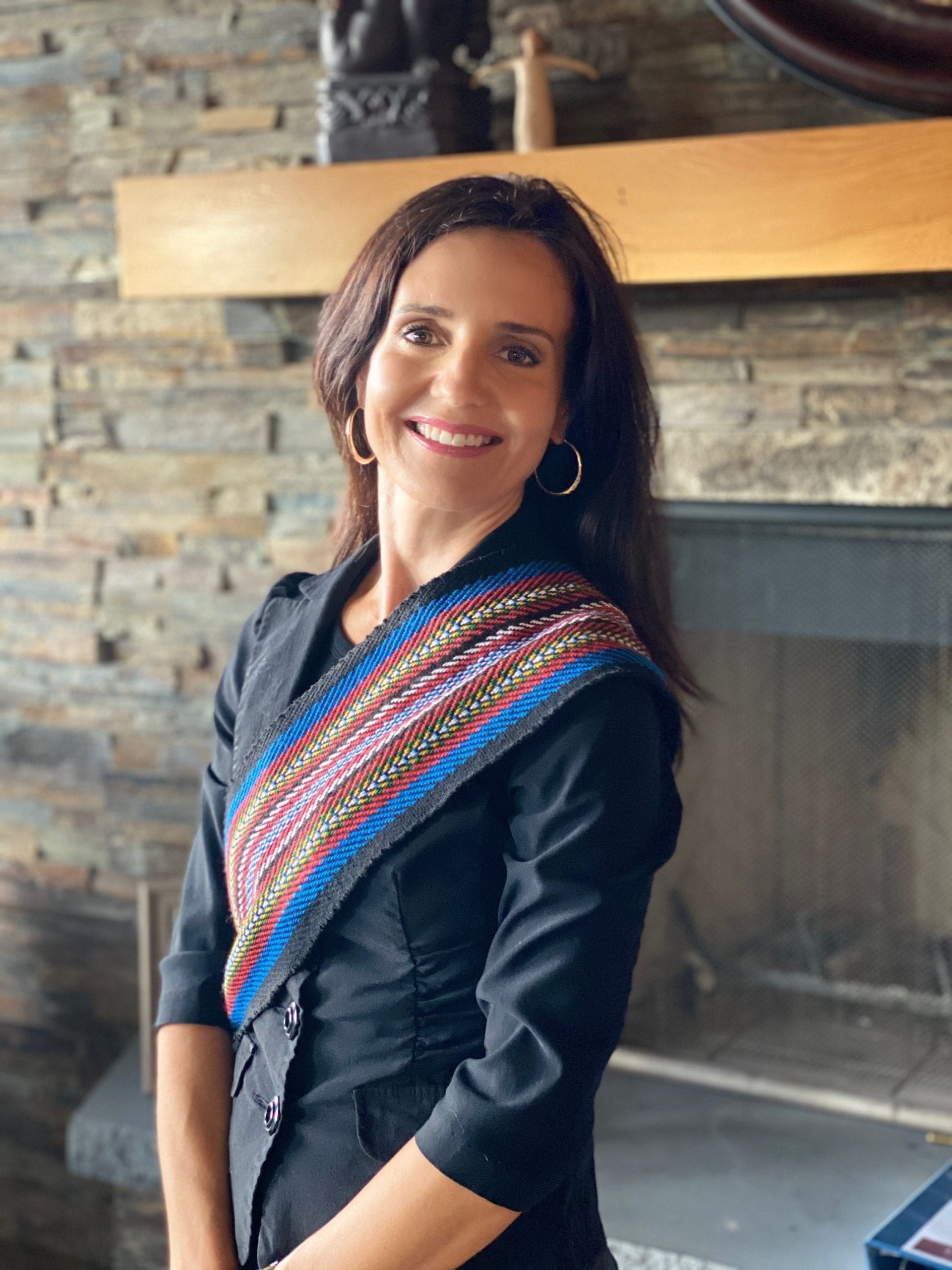
“The Importance of Self Care”
We recently had two days of strategic planning with our Elders at Harrison Hot Springs. One of the days our leadership team and elders went into breakout groups, and we wrote out what we felt was going well and what needs to be improved at Xyólheméylh. What the leadership team and Elders wrote on our post it notes was almost identical! The Elders offered suggestions on how we can continue to move forward in a good way and made recommendations on how we could make things better in our supporting children, youth, and families.
They talked to us about scheduling self-care into each of our own personal plans as well as with our teams and said it needs to be in our overall strategic plans. We heard loud and clear if we do not take care of ourselves, we cannot take care of others and are not living our best lives. This is something we have heard over and over and I am certain many can relate to this.
I made a choice after the session, that I needed to hit the reset button and put myself on my priority list. That list includes wellness breaks each day and getting back to the basics of what I was taught over 25 years ago from my life coach: “Good Things In… Good Things Out; the science of how our thoughts and words we speak become our reality.”
I started getting up five to 20 minutes earlier thanking the creator for the beautiful day ahead and saying and feeling three things I am grateful for. I then say a few positive affirmations outloud i.e.) I am happy, I am healthy and have an abundance of energy, I live a life full of value and purpose. I am working to become all the creator has set out for me to be. My day is set.
At the end of every workday I sit in my car and I say outloud: “Creator thank you for opening the door for me to be part of the Xyólheméylh work family who all strive to live and work with our organization’s core heart values (Honor, Engage, Accountable, Respect and Trust) in all we do." We are champions for change and give people hope. We honor every child's inherent right to their identity and want them to be proud of who they are and what they belong to. We do everything with a good heart, a good mind, and good feelings.
Doing this has helped me feel more balanced, and I feel a regained sense of purpose. I am grateful to everyone who reads our newsletters, and for providing support to our Xyólheméylh family. I wish you all an abundance of positivity, love, and gratitude.
From my heart to yours...
Penny❤️
Xyólheméylh and Archway Enter Collaboration Agreement
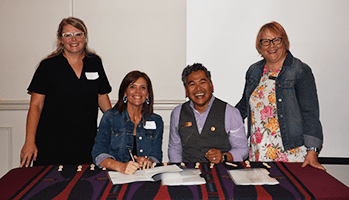
Photo: L-R: Laura-Dawn Wilkin, Kyla Darby, Rod Santiago, Maria Cargnelli
Xyólheméylh and Archway Community Services entered into an interagency collaboration agreement on Tuesday, Sept 27th in a signing ceremony. The ceremony joined the two families of Archway and Xyólheméylh. The agreement will strengthen services for Indigenous individuals who access Archway’s child, youth and family programming.
Over 40 individuals attended the ceremony including Indigenous elders, leaders from the Màthxwi (Matsqui) and Semà:th (Sumas) First Nations, city councillors, MLAs, and representatives from Xyólheméylh, Archway, Abbotsford School District, Foundry Central Office and the Ministry of Children and Family Development (MFCD).
“It’s an honour to have Archway embrace the wisdom of Xyólheméylh elders to improve programming and service delivery to the Indigenous children, youth and families we serve together,” said Penny Trites, Xyólheméylh Executive Director of Staff and Community Relations.
The goal of the partnership is to ensure that services provided by Archway and Xyólheméylh are integrated, coordinated and culturally safe for Indigenous clients. The partnership also enables Indigenous children, youth, and families to access a broader range of culturally safe services provided by both agencies.
While Indigenous individuals have long been eligible and included in many Archway services, Archway committed to a more inclusive and intentional approach to understanding the history, culture, protocols and priorities of Indigenous Nations in their 2019-2023 strategic plan.
“Getting here has been a beautiful journey,” said Rod Santiago, Central Executive Director as he shared his personal and Archway’s journey to truth and reconciliation as they’ve grown in their understanding of Indigenous culture and history.
“By being more intentional about building relationships and listening to and learning from our Indigenous neighbours, we have gained a better understanding of the resiliency of their cultures and how we can be better allies.
“This formal agreement is an important step to signify our commitment to reconciliation and supporting Indigenous self-government. We’re extremely grateful to the Elders for sharing their wisdom with us.”
Archway and Xyólheméylh agree that, whenever possible, services to Indigenous individuals should be delivered and governed by Indigenous people. Since this is currently not always possible, Archway and Xyólheméylh are committed to developing and maintaining a collaborative partnership.
Going forward there will be regular meetings between representatives of Archway and Xyólheméylh for information sharing, guidance, and reviewing gaps and successes in community services for Indigenous individuals. Archway staff will have the benefit of an Elders Advisory group from Xyólheméylh who will work directly with Archway. Their guidance will reduce barriers to access and deepen and broaden the cultural safety of services across Archway and in specific programs within the Archway Counselling, Child, Youth and Families department.
“What we have here is an amazing relationship that is going to move us forward,” said Kyla Darby, Xyólheméylh Executive Director of Programs. “And I’m hoping this challenges other community organization to do what we’ve done here.”
The Speaker of the signing ceremony was Brice James, a member of Sumas Nation who also sang with drummer Chris Jimmie to open and close the ceremony.
Rod Santiago and Maria Cargnelli of Archway along with Kyla Darby and Laura-Dawn Wilkin of Xyólheméylh signed the agreement on behalf of their two families. The ceremony was witnessed by Màthxwi Chief Alice Mckay, Semà:th council member Troy Ganseveld, MCFD Executive Director of Services Walter Serraglio, Abbotsford School Superintendent Kevin Godden, Deputy Mayor Ross Siemens, and MLA Bruce Banman. Witnesses commit to bringing back what they learned to their communities and shared their observations after the document signing.
Chief Mckay shared that the children’s services agency has grown leaps and bounds and that they are now working together to care for their children. “The most important thing to me is our children because we’re building our future.”
Ganseveld compared the ceremony to wedding vows and advised that similarly “to be successful and strong there needs to be lines of communication, the respect for one another’s agencies and openness to criticism to help build each other up.”
Serraglio reflected on how things have changed over his past 33-year career with MCFD and how things have changed for the better. Serraglio said he heard the challenge and will go back to his work and personal family to share what he learned.
Godden recognized that schools have been weaponized against Indigenous culture and paraphrased Honourable Justice Murray Sinclair when he shared, “schools got us here and schools will get us out.” Godden also talked about the importance of helping students develop a positive personal and cultural identity so everyone is proud of who they are.
Siemens said it was meaningful for “us as a city” and recognized the partnerships between all the agencies saying, “we work together, it’s about not just physical healing but spiritual healing.”
Banman talked about how his family history going back to the late 1800s was intertwined with local First Nations. He thanked the First Nations for sharing their wealth back then and now, despite it not always being repaid. “What we all want as we move forward is for what’s right and what’s best for our children. This marriage of these two families is more than just symbolism, it’s much more than that. It will help with healing as we move forward and will help for us to learn about one another.”
In his closing remarks, James shared, “people are healing and that’s a beautiful thing.”
“The next generation is embracing our culture… our future looks pretty good.”
Attendees were given a parting gift of a pebble for grounding and to remind people of our connection to the land and to community. Small paddles were also gifted to signify that we all share a responsibility to paddle together. “Now we’re all in the same boat and we will travel a lot faster and a lot more efficiently,” said James.
Meet Caregivers: lia and mike goodmurphy
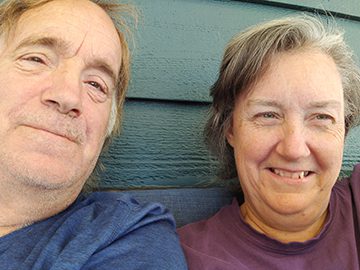
Lia and her husband Mike currently have five children they are caring for in their home in Abbotsford, ranging in age from 22 months to 14 years old. They have seven children of their own who are now grown up and living away from home – two are Mike’s and five are Lia’s. Lia became introduced to the Indigenous world as her four children are part Indigenous.
Lia began fostering children right out of high school. When she moved to the mainland in 2003 she took a break from fostering but when one of Mike’s children was unable to care for her children, they became the official caregivers. From there, in 2015, she has continued to care for children in need. She has been with Xyólheméylh since 2017. “I enjoy having lots of kids,” says Lia.
Lia and Mike have a passion for having contact and honouring the children's families. “We try to provide a good home and try to support the family as much as we can,” says Lia. “When the child is returned to their family we do our best to help the parents with whatever they need. For instance, we had a child go home, he was 22 months old, but mom and dad were separated, so we found cribs, toys and high-chairs so both parents would have things for the baby.”
Lia says that it can be emotionally hard to see the children returned to their families. “But at the same time, you’re happy to see them returned to their family. That is what the goal is right?” She says her husband Mike finds it’s harder than she does, especially when they foster a baby from birth.
While the children are in her care, she tries to keep them connected to their Indigenous culture. “It’s been hard the last couple of years because of COVID, but in previous years, I have taken the kids to pow wows and potlaches, made sure to have lots of Indigenous books at home, and try to keep their culture in the forefront of the minds,” says Lia.
“Our lives are busy, we love fostering. We wouldn’t do it if we didn’t love it, we try to provide a good home,” says Lia.
Lia and Mike and other caregivers make a huge difference, offering safe and loving homes. We lift our hands to you and all the Xyólheméylh caregivers. If you are interested in becoming a caregiver we have info sessions the 2nd Wednesday of the month at 6:30 pm and the 3rd Tuesday of the month at noon. Contact Norma Commodore at [email protected] to register.
New feature: Si:yólexwe teachings
Meet an elder: desta branham
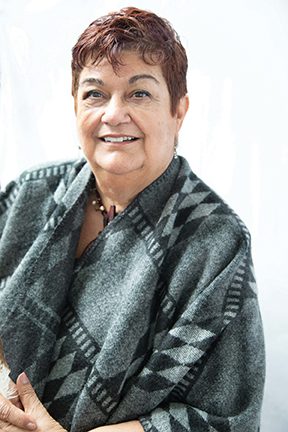
Desta made a decision a long time ago to look on the bright side of life. She says she didn’t want to be one of those old people who “got sour and crabby.” Looking at the bright side of life is a theme she explores in her creative writing which has won awards and a quality she brings to Xyólheméylh as an Elder. In her writing, she has explored the power and sweetness of friendship, the circular nature of life, the slowness of life in Haida Gwaii where she lived for a time, and the foibles of being human. “I’m a life student,” says Desta, who is proud of being sober for 35 years.
Desta is from the Tl’etinqox-t’in First Nation First Nation (formerly known as the Anaham First Nation) from the Cariboo region in BC. She has lived in Stó:lō territory since 1985 where she says she has been “warmly welcomed by the Stó:lō people”
Desta has a diploma in criminal justice and worked for Xyólheméylh for approximately 10 years a family outreach worker in Langley and Chilliwack and prior to that she worked in community development in various on and off reserve communities in BC. She is the mother of three children, grandmother to seven grandchildren and four great grandchildren.
Desta’s mother was a residential school survivor from St. Josephs at Williams Lake and she didn’t want her children to face the same fate during the 60s Scoop, so Desta wasn’t exposed to her Indigenous culture. “She didn’t want us to identify as Indigenous. In fact, she told me I was Spanish,” says Desta.
It wasn’t until 1985 when her mother moved to Chilliwack and got her Indian status that her mother and Desta herself started immersing themselves in their Indigenous heritage. “It was like watching a person wake up,” Desta says of her mother. “It was a cultural and spiritual awakening.” It was then that Desta began to see the richness, beauty and texture of the culture.
Desta loves the strength-based model that Xyólheméylh uses, with a focus on seeing the strength in families. She also likes that Xyólheméylh is consulting with Elders and using traditional circles for healing. She is particularly interested in working with young parents, having had twins herself at the age of 17 years. “It was a hard time, a very lonely time,” says Desta.
She also believes her strength is working with the urban Indigenous populations in Stó:lō territory, 80 per cent of whom are from communities across Canada. She believes that Indigenous cultures can learn from each other and use the good teachings from other First Nations. “To me, culture is your real identity, pride in who you are, it gives us self-esteem.”
Medicine Teachings with the Elders
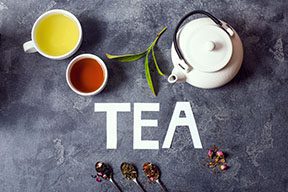
ask an elder: burnings with louise silver- Kaarsmaker (Masquaelta)
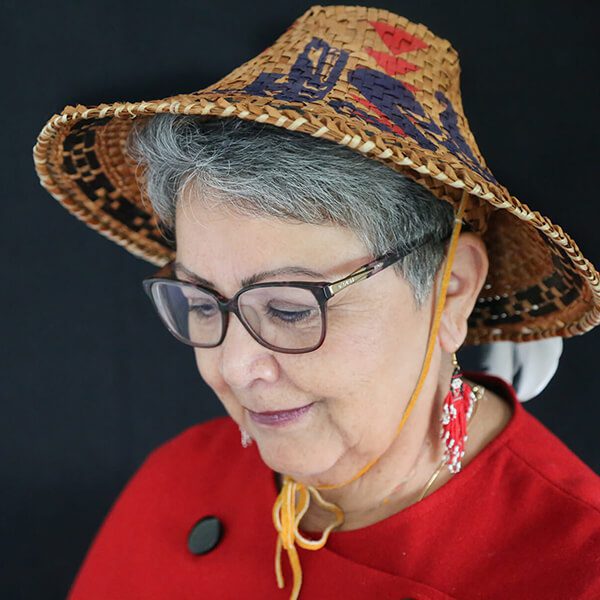
Question: What are burnings?
Most every Stó:lō family has a burning once a year, for their loved ones that have passed. At that time the family usually burns individual plates for each loved one. There are occasions when the loved one will inform a family member that they would like a certain personal possession burned. (E.g. clothing, knitting or crocheting material, a favourite blanket or pillow, or maybe even a piece of jewelry. )
There is always a burning done when a loved one passes away. This usually takes place sometimes @ 5:00 am or 3:00 pm on the day of the burial. At this time food and most of the deceased’s possessions are burned.
There are also burnings on the day of the longhouse season. Food is burned for the ancestors, as they are aware of the opening of the longhouse.
There are burnings when a person or people are being bothered by the spirit world. This is usually how the spirits let the living know that they (spirits) need something.
This is one of the ways that we take care of our loved ones.
If you have a question for an Elder, please send it to [email protected]
Community Profile: Skowkale First Nations
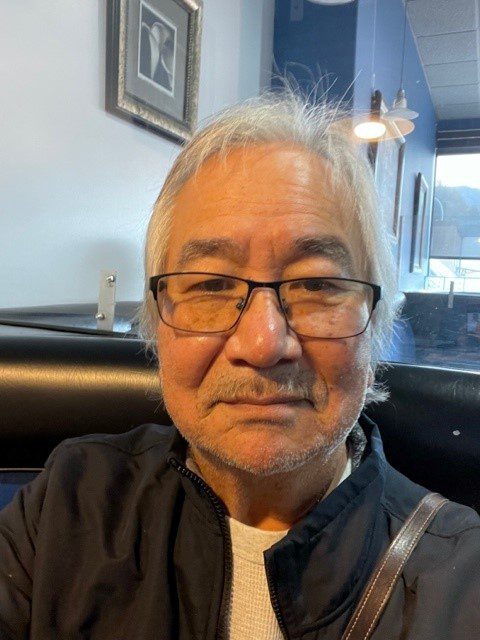
Pictured above: Chief Mark Point
Skowkale First Nations Chief Mark Point believes that the time is right for First Nations people to begin the process of looking within to find solutions to problems in their communities. “We have the means ourselves to find solutions to our problems. Our people in the past survived for centuries before the xwelítem (settlers) came. We have to be resilient and we have to become self-sufficient if we’re ever to realize the return to a semblance of life as Stó:lō people.”
“It’s about starting the conversation and asking if we are at a point in time in our own history that we can begin the dialogue, the process of finding solutions to our problems ourselves. I believe that we have to. We have to begin the work, begin the mindset that we have within ourselves to find the solutions,” says Chief Point.
That is the thinking behind the Resilient Communities Project that he is working on with other Stó:lō First Nations. Their first meeting was on Sept. 22, facilitated by Four Directions, and was to begin the conversation about what the short term, mid-term and long-term goals are, and to identify how to begin implementing solutions.
He believes the time is right. “We can to it today. We have enough educated people, enough Elders to say this is what worked in the past, this is what we can change. The teachings of our past are still very valid today – about being a good person, about teaching people responsibility, of giving them duties when they’re very young … There are so many challenges that we have to put on the table and have conversations and talk about them objectively,” says Chief Point.
Chief Point has been involved in the leadership of Skowkale First Nation since he was in his early 20s as a council member, then eventually as Chief off and on, often taking turns with his brother Steven. The governance structure of Skowkale is an elected chief, four representatives from the major families, and councilors who are elected by their families.
Mark is the third oldest of ten children in the Point family, seven now living. His mother is Rena Point Bolton and his late father was Roy Point. His brother Steven Point is a well-known leader in the community and is Chancellor of UBC. The family all live at Skowkale. He believes they are leaders in their community because they combine a knowledge of traditional culture and a belief in education.
“My greatest mentor has been my mother. My mother’s dream was to be educated, but she was also a residential school student and when they closed Coqualeetza, they moved all the kids to Port Alberni and her family wouldn’t let her go, so her dream of getting educated didn’t come to be, but she passed that dream on to her children. All of us were successful in our education, and our children as well,” says Chief Point.
He was one of the first people in his community to go to university. He started with a BA in education, a Masters in Education Leadership and is currently a doctoral candidate at UBC. His dissertation is on finding ways to improve education success for First Nations students.
In talking about his work he says: “It boils down to the living conditions of our people, period. How students perform in school is really a symptom of our society,” he says. Because of the impacts of colonialism and the intergenerational trauma it caused, it has led to over representation in the judicial system, the child welfare system, lower success rates in school, higher unemployment, higher than average number of people living in poverty. “Our kids not doing well in school is a symptom of the condition of our First Nations society,” says Point.
When Chief Point was first elected six years ago he undertook a comprehensive community plan. “We talked about the importance of families, we talked about the importance of culture, we talked about housing, we talked about creating our own wealth, and we’ve addressed all those issues. They’re either underway or completed,” says Point.
He says the community has paved roads, excellent housing, a new community facility they share with two other bands, band offices, a gymnasium, health offices, a place for Elders. Under construction is a daycare facility, and two subdivisions.
“Skowkale is very fortunate in that we have a lot of young, educated people,” he says. One of his priorities was to get more people involved in the decision-making process, so a number of committees were established. “The more people we get involved, the more understanding we have and the less conflict we have when more people know what’s going on. My priority has been to spread out as much information as we can and get as many people involved in the decision making, and it’s worked really well. You can see our community has grown really well. We’re not perfect, we make mistakes but we fix them. I think we’re a model for a lot of other communities,” says Chief Point.
Meet a FVACFSS Board Member: Jade Victor
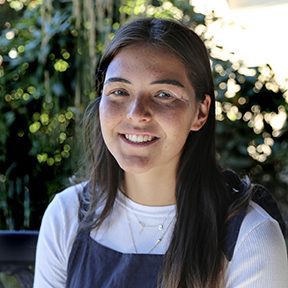
Jade is the youngest member of Xyólheméylh’s Board of Directors. While she has accomplished a lot in her 22 years, she believes her youth is an advantage to the board. She brings a different, fresh perspective and is able to ask questions freely.
Jade is the daughter of Dr. Wenona Hall from the Skowkale First Nations and Ernie Victor from Cheam. She grew up on Skowkale First Nation, and was immersed in Indigenous culture – Longhouse traditions, cultural gatherings and spending time with Elders. She also grew up with strong female role models - her mother, her grandmothers Sandra Victor and Becky Hall, as well as her great grandmother Shirley Leon . “We have very strong women in our family and I think it’s really cool to watch them do what they do,” says Jade.
Jade has a BA in Political Science and Indigenous Studies from the University of the Fraser Valley, and is currently working on a Masters of Education at Thompson Rivers University. She is passionate about language revitalization and is working on a project with the Simbi Foundation where they take Halq’emeylem lessons and teachings and turn them into audio books. She is also working for Stó:lō Tribal Council on the Indian Residential School Project where she interviews residential school survivors to document their stories. She is considering doing a Masters of Political Science and perhaps Law School in the future. “No matter what I do I want to be able to give back to my community and contribute to not just Stó:lō people, but all Indigenous people,” says Jade.
Jade has tremendous respect for the staff and Elders at Xyólheméylh. “All the work that everyone at Xyólheméylh is doing is good spirited, good hearted and centered towards moving forward. I don’t think anyone at the agency wants things to stay the same,” says Jade. “A lot of our non-Indigenous staff are showing a lot of interest in learning about Indigenous culture and Indigenous ways of knowing which is a huge step forward. We’ve had requests from staff to learn Halq’emeylem,” she says.
In her free time, which is not a lot, she plays soccer with the Rainbow Stars (the team her grandmother used to play for), and has started baking, but says her work/play balance is a bit off. “It’s hard to separate work and life because everything I do has to do with my life, I can’t come home and stop being Indigenous, it’s pretty hard to separate,” says Jade.
“I really hope to make a difference on the board, even if it is just one child or one family, I really hope I can make a difference. I’m thankful for all the people at Xyólheméylh, it truly is a family, it’s amazing to be part of,” says Jade.
meet Xyólheméylh’s finance team
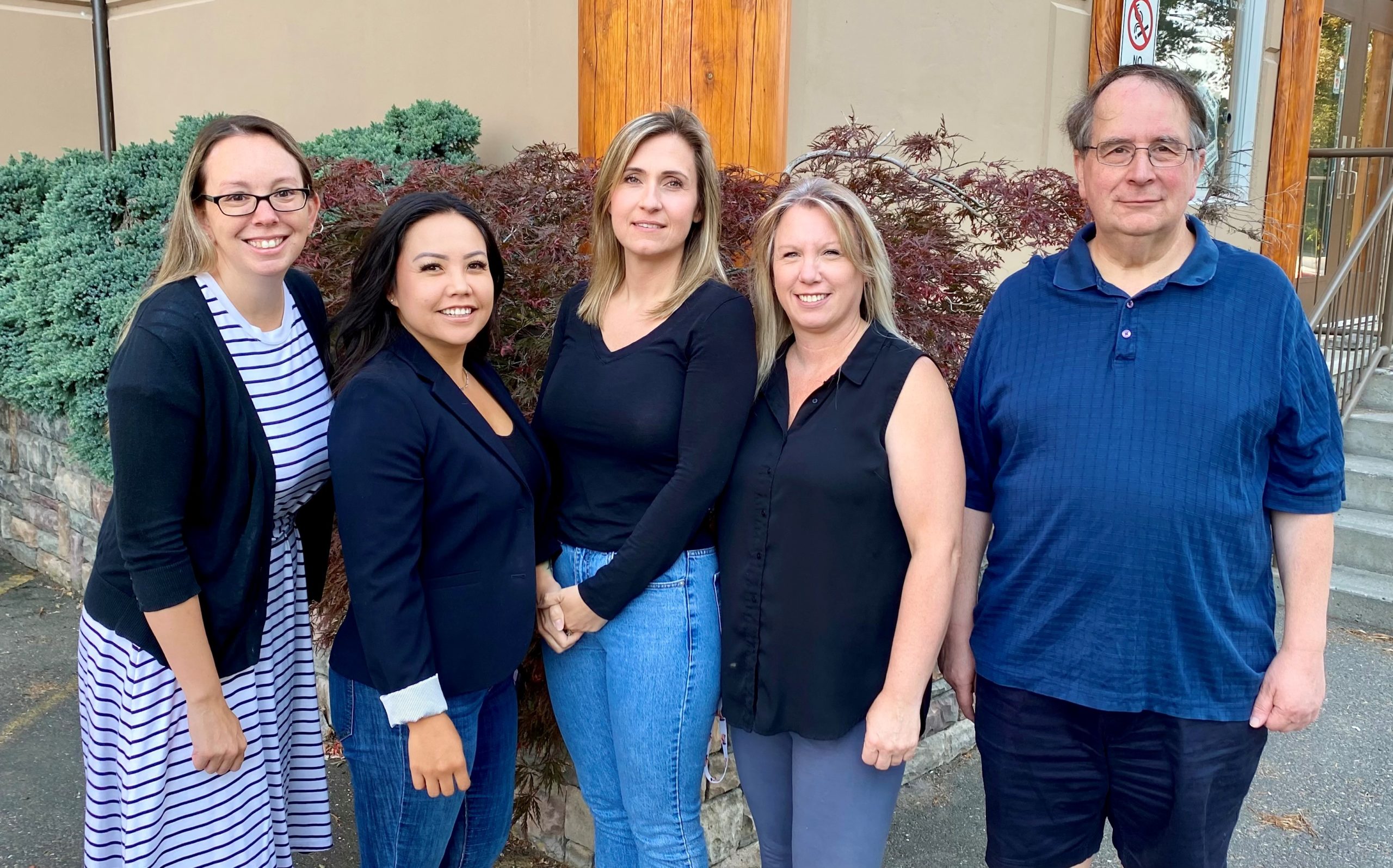
Pictured above (Krista Sidhu, Sheena James, Melissa Chapko, Candy Katuski, Jeff Hoff)
Xyólheméylh’s Finance Team is led by Finance Manager Krista Sidhu; and includes Jeff Hoff, Accounts Payable Clerk; ; Melissa Chapko, Finance Coordinator; Candy Katuski, General Ledger Clerk; and General Ledger Clerk Sheena James. Together they are responsible for payroll, accounts payable/receivable, service contracts, reviewing expense claims, and ensuring that Xyólheméylh is adhering to policies and procedures as it relates to finance. The Finance Team reports to Rod Spitzig, Executive Director of Administrative Services.
One of the team’s top priorities each year includes the annual audit, which holds the agency accountable to our communities and partners. They are proud to say this was completed in August 2022. The team is also focusing on streamlining the new payroll system, ADP & Synerion.
“My team is passionate in assisting Stó:lō communities and urban/off-reserve families. Even though we don’t directly interact with the children and families. The whole team cares and is driven though our H.E.A.R.T values to do what is in the best interest of our communities, and we feel we have a positive impact” says Krista. “That is one of the reasons we love working in Finance at Xyólheméylh.”
The team would like to leave you with a fun math problem:
There are 85 people in the office. Some are frontline staff; some are admin. If the ratio of admin staff to frontline staff is 2:3, how many frontline staff are there?
Recipe: Glenda Campbell's canned peaches and pears
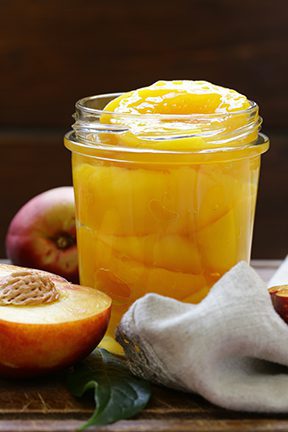
This is Board member, Glenda Campbell's recipe for canning peaches and pears.
Canned peaches/pears
- Start a hot water bath on stove put on high to get hot, fill half way and then put peaches in. Buy the freestone peaches for canning or Gold and usually a box is 25 lbs. Peaches are costing 45.00 a box right now.
- Take your peaches out after a couple minutes, as you only are putting them in to remove the skin.
- Place in cold water in sink. Take the skin off and stone and place half peach in and pile up until filled.
- Face the peach down when piling.
- MAKE YOUR SUGAR WATER TO PUT IN THE JARS.
In large pot, put 5 cups of sugar and 5 cups water. Sugared water.
You can make as much as you want depending on how much your canning. Boil until sugar is dissolved.
- In your filled jar of peaches place a knife down in the jar on one side and take out, then do the same to other side of jar. This is letting the air out of jar. Then put your sugar water in until it covers your peaches.
- Always boil your widemouth lids on stove for 2 min, then take it off stove and put lid on jar. Take your ring and tighten on the jar.
- Ready for cooking. Wipe down your peaches as they get sticky from sugar water. Place them in canner on the removable rack, should hold 6 or 7 jars. Put cover on, and place on element of stove or outside propane cooker, and wait for it to boil.. When it reaches a full boil, start timing for 20 minute. Peaches or pears only take 20 minutes.,
FOR PEARS:
- This is done all in sink, take off the skins, cut in half and place in jars.
- Cook the sugar water and put in the jars filled with pears
- Put lid on and ring
- Put in canner and cook 20 min to seal the lid
MAKE SURE TO CHECK ALL JARS WHEN THEY COOL DOWN TO SEE IF THE LID SEALED. IF IT DID NOT SEAL IT IS OKAY TO PUT NEW LID ON AND COOK AGAIN FOR 20 MIN OR YOU CAN EAT IT.
Enjoy!
Meet Our Community Partners: Gracie Kelly, Indigenous Relations Manager with Chilliwack Divisions of Family Practice
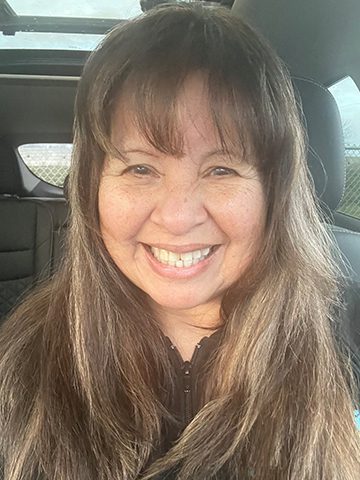
Located on the traditional, ancestral, and unceded territory of the Coast Salish, Stó:lō, and Nlaka’pamux peoples, the Chilliwack Division of Family Practice is a non-profit society that represents family physicians and nurse practitioners in Chilliwack, Agassiz, Seabird Island and Hope. They also have medical residents, and medical students as associate members.
Their members provide primary care services to over 100,000 community members from Chilliwack to Boothroyd and strive to improve health care services for patients by supporting an engaged and collegial medical community. This includes 22 First Nations communities and a geographical landmass of over 40 per cent of the Fraser Health Authority. The Division is committed to improving health care services for patients by supporting an engaged and collegial medical community.
A crucial component of their work is representing the interests of and building relationships with Indigenous people and that is Gracie Kelly’s role as Indigenous Relations Manager. Gracie is from the Soowahlie, and Xaxlip First Nations. She listens to what the First Nations communities want and advocates for consistency in the health care that Indigenous communities are receiving. She accomplishes this by working with the Primary Care Centre and connecting with and supporting Indigenous communities in the Fraser Valley. Gracie also provides formal and informal training, such as how to do territorial acknowledgements and cultural safety and humility training; networks with communities to support traditional wellness practices and aligns services so they support community sharing. She also is working on how to better support under-served urban, off-reserve Indigenous people.
Gracie organizes and hosts Cultural Sharing Series webinars every month with a focus on sharing Indigenous wisdom and building Indigenous relations. The series are attended by participants from the Divisions of Family Practice, the Health Authorities, community and health care organizations, local and provincial government, educators, and others from across the province. The webinars are open to anyone who is interested in learning about Indigenous awareness.
The webinars are guided by the following principles: the importance of relationships and community connections; the importance of acknowledging and listening to personal stories and experiences; the need for non-Indigenous people to be more active in reconciliation; the trauma is ongoing; and the need to heal together.
“The idea of the cultural sharing series is to share highlights of local Indigenous communities and also to share knowledge keepers, credible Indigenous resources and last, but certainly not least, sharing resources that support anti-racism work,” says Gracie. “With my anti-racism work the focus is the Truth and Reconciliation Calls to Action and addressing those calls.”
One of those calls to action is making hospital and clinic settings culturally safe places. Gracie says the Primary Care Centre accomplishes this by being a sacred space.
Until recently Gracie was the only Indigenous Relations Manager in the 35 divisions across BC. Now Nanaimo has hired one based on the success of Gracie’s role, and they are able to share resources. Hopefully, it’s the beginning of more roles like Gracie’s in BC.
"Gracie does everything with a good heart and a good mind," says Penny Trites, Executive Director of Staff and Community Relations with Xyólheméylh. "She has so many gifts that she shares with others. She makes the world a better place."
If you are interested in joining the webinar series on the last Friday of every month, please contact [email protected] for webinar details.
Indigenous children and youth celebrate National Indigenous Peoples Day through art
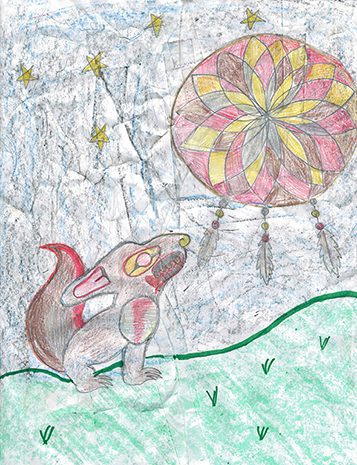
In honour of National Indigenous Peoples Day, Xyólheméylh will share the writing and art of children and youth in our newsletter in the coming months. We held our third annual writing and/or art contest, asking children and youth what being Indigenous means to them. Indigenous children and youth to express what being Indigenous means to them in writing and/or art. The entries were judged by a panel consisting of Xyólheméylh’s Board of Directors and Elders Advisory Committee, in three categories – ages 5 to 10; ages 11 to 14 and ages 15 to 24.
The children and youth expressed their connection to the land, nature, animals, and their families. They also expressed their hopes and dreams as well as their sadness with discrimination and racism.
“Many artists have painted or drawn pictures of wolves howling at a full moon. In my artwork, I have used the dream catcher as my moon because I want the dream catcher to catch and protect all my hopes and dreams of being a person who is known to protect friends, freedom, family, loyalty, and teamwork,” said Emiley, 10, of her artwork, shown above.
Kyan, who won 1st place in the Ages 15 to 24 category wrote: “Stereotypes often take over how First Nations are seen, and when someone looks at you and automatically thinks that what you are isn’t something to be proud of it makes you feel bad no matter how proud you are.”
“Thank you to all the children and youth who submitted their heartfelt art. It is truly inspiring to see the talent, creativity and the pride expressed in being Indigenous,” said Dr. Wenona Hall, President of Xyólheméylh’s Board of Directors.
Summer gatherings: Setting the table & other events
Setting the Table Feeding our Mind, Body, and Spirit
Throughout the summer we organized a weekly event called Setting the Table, Feeding our Mind, Body, and Spirit. The event alternated every week between Elwood Park in Abbotsford and either Coqualeetza or Tzeachten Sports Field in Chilliwack.
We gathered to share a meal, enjoy cultural teachings and activities for the kids. The cultural teachings had a different theme every week – Honouring our Identity (Every Person Matters); Roles in the family; Warriors and Role of Helpers; Honouring and Finding our Gifts; We all Belong to Something; We are all Together were some of the themes we explored with special guests and Elders.
As the summer went on, the event gained more and more momentum, with 75 to 100 people attending each event. Thank you to everyone who attended the events. After two years of lock down and not being able to gather, it really did fill our hearts full and fed our mind, body and spirits.
Pulling together canoe journey
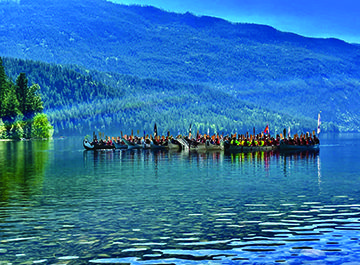
When Board member Paula Olmstead was growing up, like many Indigenous people, she was taught to fear the police, and often for good reasons. “When the police would come to our community we would hide,” said Paula who is a member of the Sumas First Nation.
Her goal now is to bridge the gap and improve relations with first responders and Indigenous people. In addition to being an appointed member on the Abbotsford Police Board, where she advises the police on Indigenous matters, she is one of the organizers, along with her husband, of the annual Pulling Together Canoe Journey. Paula did her first journey in 2012 with her husband and 13 youth from Sumas First Nation. She is now considered the matriarch of the Stó:lō Spá:th Canoe family for APD who runs the project.
The annual two-week journey began in 1997 with now retired RCMP Staff Sergeant Ed Hill and Roy Vickers had a vision of wanting to improve relations between First Nations people and the police. The Vision Quest Journey of 1995 took place on the west coast of BC with RCMP officers and First Nations peoples canoeing and visiting numerous communities along the west coast.
Every year since 2002 the journey takes a different path in BC. Over the years participants have traversed all over BC, from Vancouver Island to the Fraser River to the Shuswap territory. It has included Indigenous people mainly from BC, but from all over Canada and the US, as well as police officers from across the country. It also requires involvement from the First Nations communities who are hosts to the participants on their journey.
After a two-year hiatus, due to COVID-19, the journey was back this year. It included members of the Upper Fraser RCMP, the Abbotsford Police Department and Indigenous youth. The journey began July 11 in Chase BC at Mara Lake and finished July 21 at Green Lake with 20 participants in Stolo Spá:th family and approximately 300 paddlers with different Canoe Families.
A significant element of the journey is healing. “We become a family by the end of the journey,” says Paula. There are protocols for thanking the host community and every night there is a sacred healing circle where people can resolve problems or conflicts. “Coming out of COVID this year, a lot of heaviness came up,” says Paula. The journey is mentally, emotionally and physically challenging but provides the youth with a sense of confidence in themselves.
Aiden Silver has been on the canoe journey since he was 12 years old and he has been on every journey since 2012. He describes the canoe journey as,” The canoe journey makes me feel that it’s ok to express my cultural identity. Also it allows me to meet new people I wouldn’t have met in my everyday life.”
The participants also become a cohesive team. It requires everyone working together, both the canoers as well as the communities that host them on their journey. In addition to the communities that help them and keep them safe, there are a number of other organizations that contribute to the trip such as the Canadian Navy and the Department of Fisheries and Oceans, RCMP support boats and on occasion Search & Rescue. “It's amazing to see so many people helping with the journey,” says Paula. She compares it to the policing concept of the blue line. “It can be hard breaking into their circle,” says Paula, “but by the end of the journey, the blue line does not exist, we become a close family with lots of support not only on the journey but throughout the year.”
“I feel since we’ve been doing this, the youth trust the police more, and our band seems more welcoming to them. My goal is to create good relations and educate people on the residential schools and the damages it has done to First Nations,” says Paula.
“By the end of the journey, we are a family. I still have connections to this day with people who have been on this journey,” says Paula. The relationships don’t stop at the journey. This year the plan is to get together regularly with the family to do crafts that they will then use as thank you gifts for communities next year.
If you are interested in providing donations to the journey or interested in participating please contact Paula Olmstead at: [email protected].
visions and voices kids night
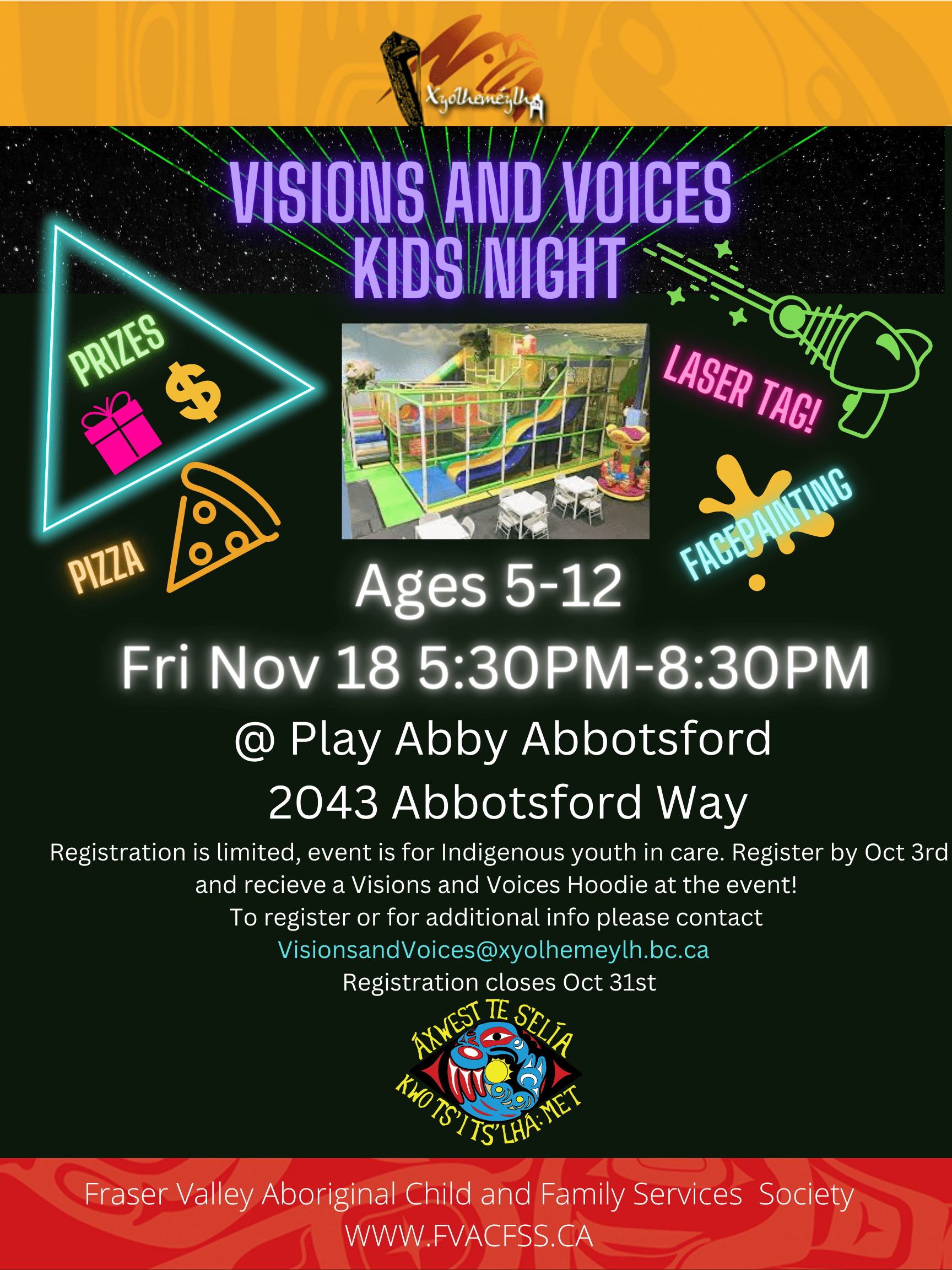
Visions and Voices has organized a fun event for Indigenous kids in care, ages 5 to 12. Pizza, prizes, laser tag and more! Friday, November 18 in Abbotsford from 5:30 to 8:30. To register, email: [email protected]. Registration has been extended, please RSVP.
caregiver appreciation night: October 19
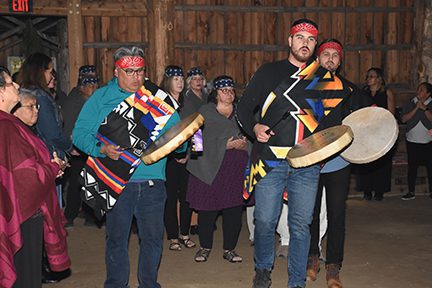
After two years of not being able to gather in person, Xyólheméylh held a special Caregivers Appreciation Event on October 19. Approximately 70 caregivers were honoured and blanketed at the Coqualeetza Long House in Chilliwack.
Staff and caregivers shared a meal, which was followed by the blanketing of the drummers and the Speaker and the calling of witnesses. The caregivers were blanketed outside and led by the drummers, entered the Longhouse. They were given gifts and heard from several of the witnesses how valued they are. The Speaker for the event was Tyler Epp from the Tzeachten First Nation and Associate Director of Operations, Stó:lō.
"We honour all the hard work you do ... we're here to celebrate you and I hope you realize how much we care for you," said Rod Spitzig, Executive Director of Administrative Services.
Inderjit Aujla, Director of Operations, Resources, expressing her gratitude in Punjabi said: "Koi jarur change change karm kite honge jo tuhade sahmne khare hoke kuch kehn da moka milia ha,” which translates to: “I must have done some good deeds in my life to get this chance to stand in front of you and say a few words."
2023 Daytimers for Sale!
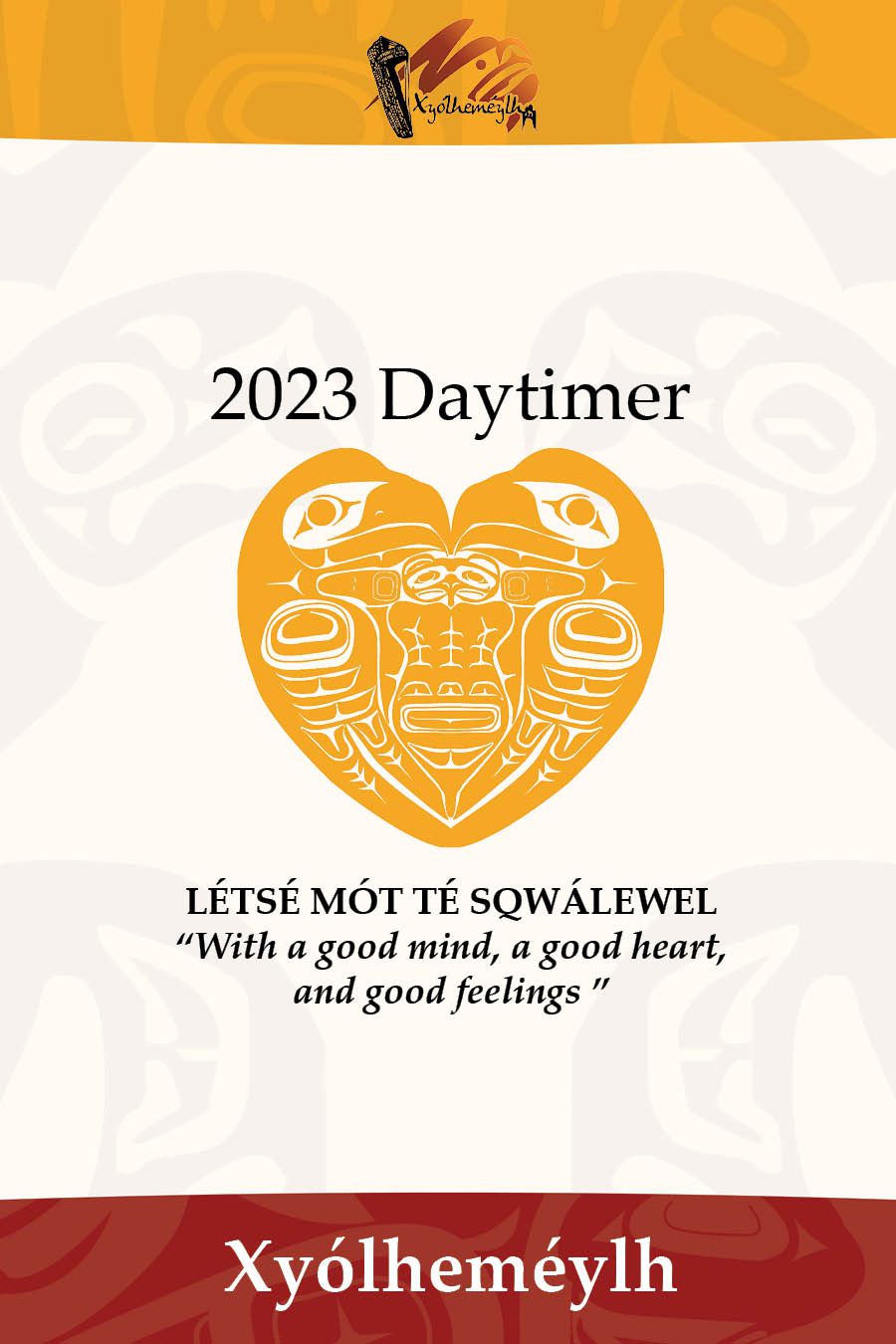
youth paint & mural project
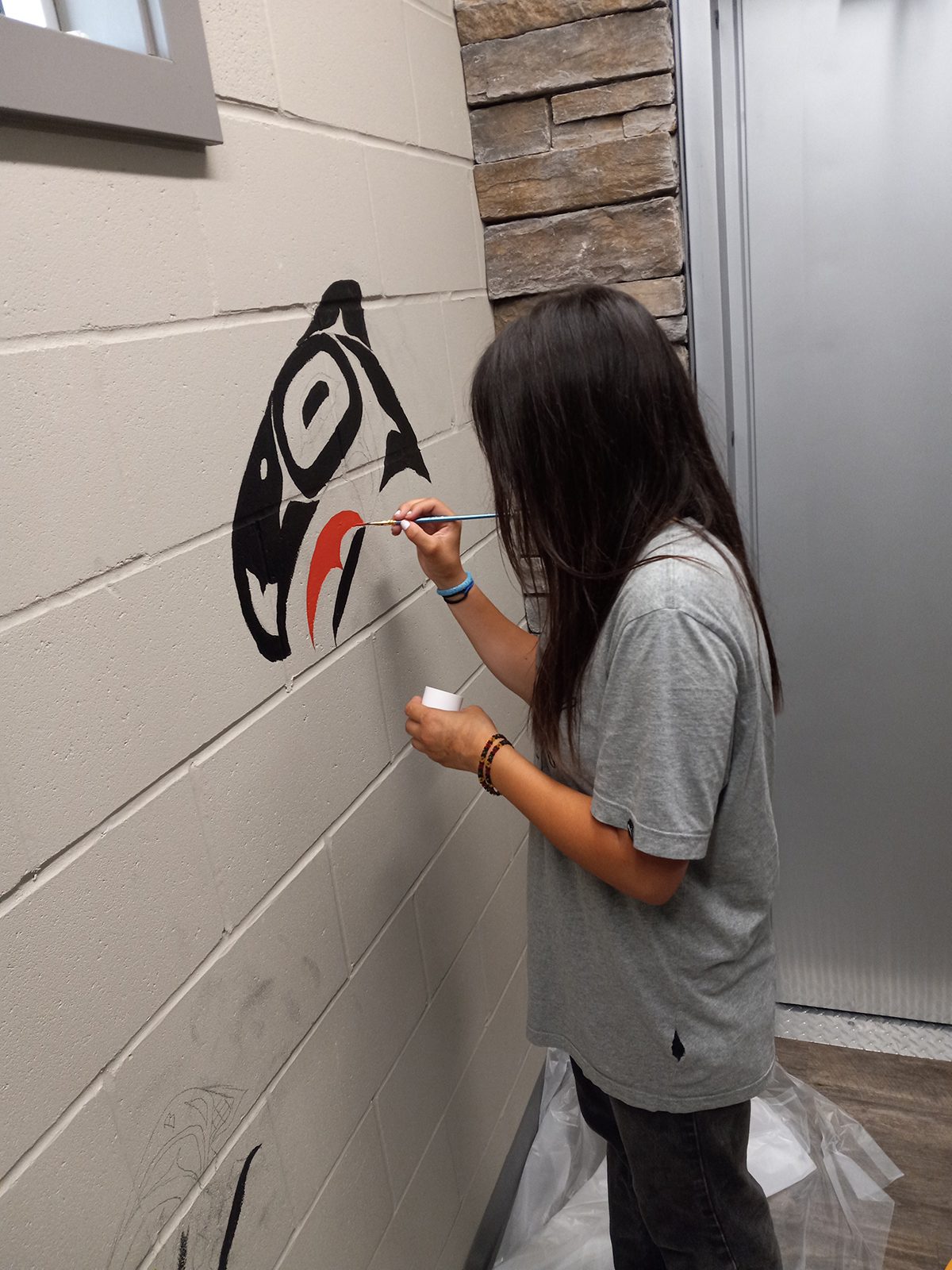
In August, Xyólheméylh and Tzeachten First Nation hosted a youth mural painting project at Tzeachten First Nation. The project was led by Tzeachten First Nations artist, Fred Jackson. The purpose of the mural is to celebrate Indigenous youth and their creativity through art while receiving teachings about the importance of being proud of their culture and inherent right to identity and belonging.
Business Excellence Awards Nomination
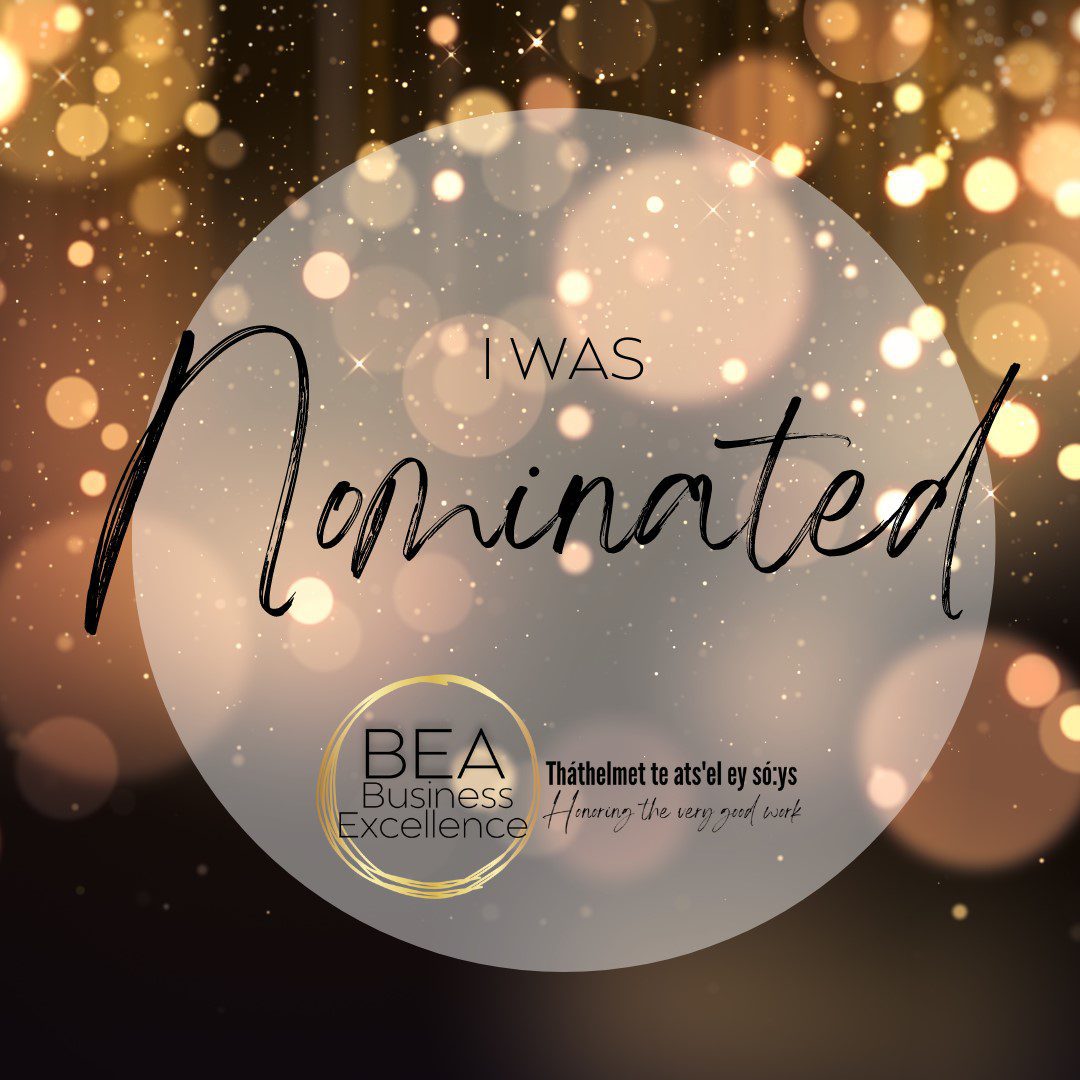
We were honoured to be nominated for a Business Excellence Award from the Chilliwack Chamber of Commerce for a non-profit that has made a significant contribution to the overall health and liveability of Chilliwack! This nomination is the direct result of the amazing work of our staff and it is a great honour to be nominated for this. This recognition demonstrates how we work with our HEART values and how we are walking together with our community members.
upcoming christmas parties
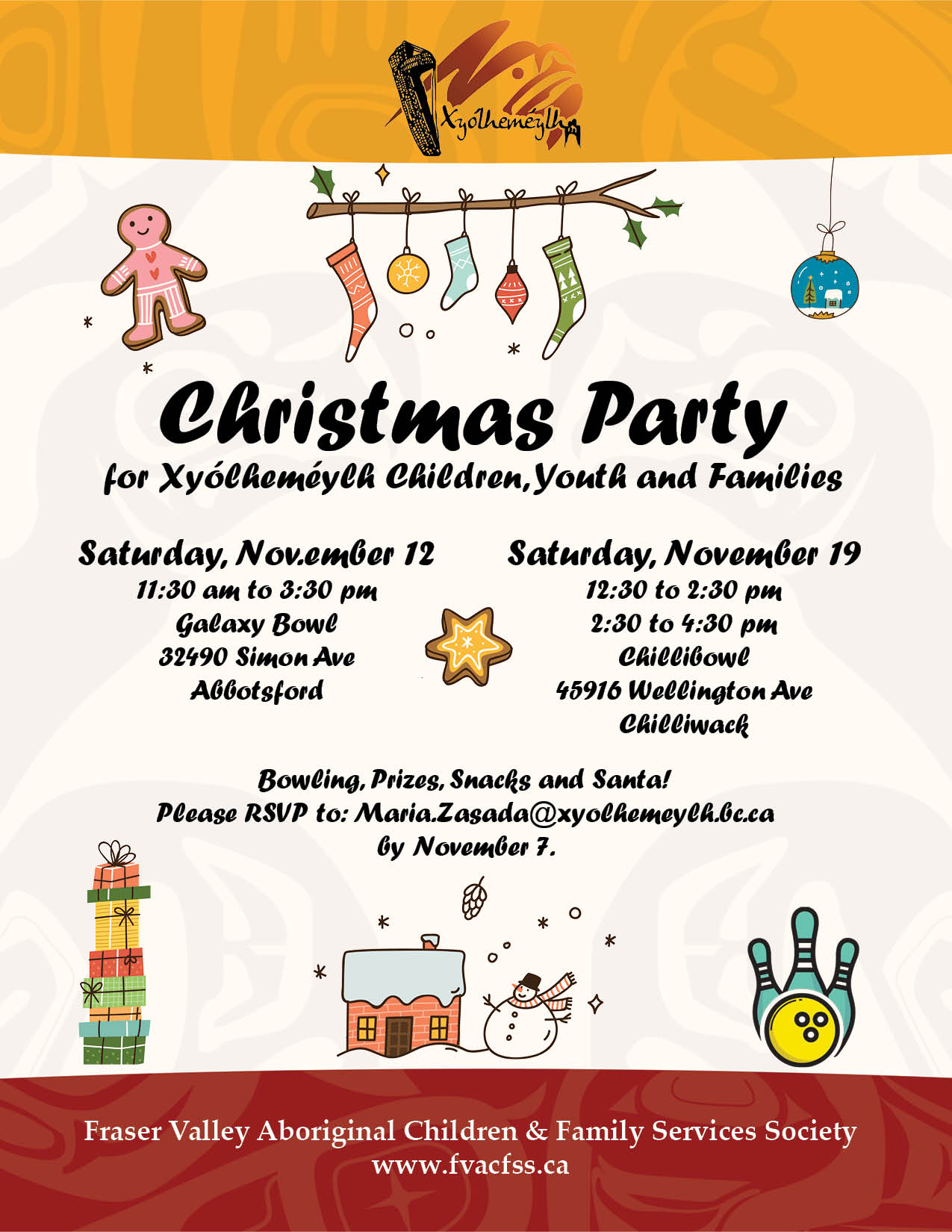
christmas hamper donations
